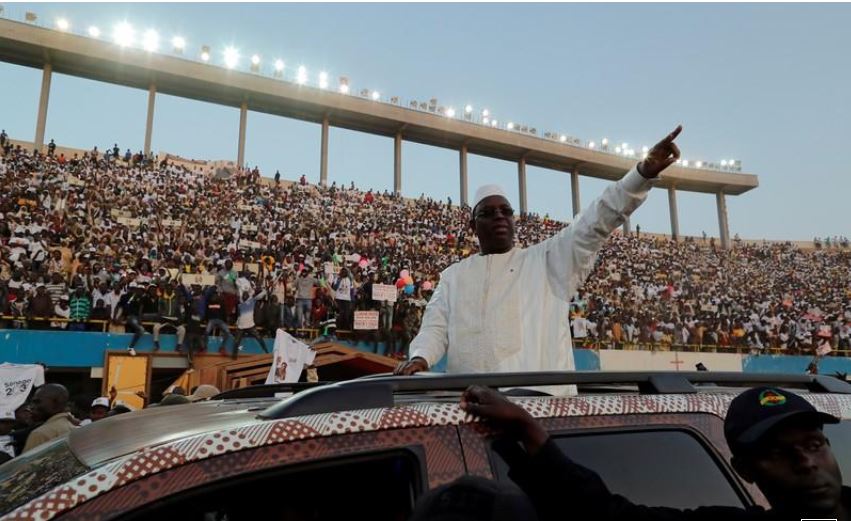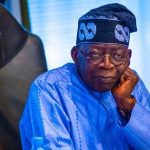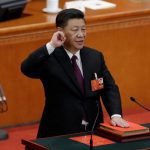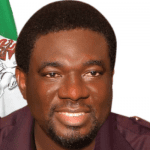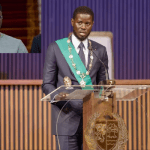Senegalese voters headed to the polls on Sunday for an election President Macky Sall is expected to win after strong economic growth in his first term, although rights groups criticize him for squeezing out rivals.
Senegal’s small fish-exporting economy expanded more than 6 percent last year, one of the highest rates in Africa, driven by an ambitious reform and development plan that included the construction of a new railway.
The 57-year-old told thousands gathered for his final rally in Dakar on Friday that he would deliver universal healthcare and better access to education in a second term.
“Victory in the first round is inevitable,” Sall had told a crowd earlier in the week.
About 6.5 million people are registered to vote at polling stations that opened at 8 a.m. (0800 GMT) and close at 6 p.m. Official results are due out on Friday with a run-off for the top two on March 24 if no one secures a majority.
After casting his vote in the president’s hometown of Fatick, pensioner Adama Sakho, 81, said he believed Sall would win in the first round, praising his social spending policies.
“I’m retired, and now in one month I receive the same amount of money I used to make in three months,” he said. “He has the hand of God. Everything he touches gets realized. And he brings luck, because it’s during his reign that we found oil and gas.”
There are hopes of an oil and gas boom in Senegal as energy majors develop previously untapped fields off its Atlantic coast.
Opinion polls are banned in the run-up to the vote, but a survey by a Senegalese data company in November gave Sall 45 percent support. Of his four rivals now lined up in the smallest field of candidates since 1988, none had more than 16 percent.
Despite Sall’s popularity, some citizens question whether a high-speed train, new motorways and a swanky conference center will benefit average citizens in the former French colony of 15 million people where the average income is less than $200 a month.
Many people do not have reliable water or power supplies.
University professor Bakary Manga, 43, said he would vote for opposition candidate Ousmane Sonko as he was disappointed in Sall’s first term.
“It was a big nonsense with him. The cost of his projects is excessive, we can do much better with much less,” he said as he queued at a polling station in Dakar.
Rights groups have criticized the exclusion of two popular candidates from the race in the West African nation that has long been viewed as the region’s most stable democracy. It has seen peaceful transitions of power since independence in 1960.
Former mayor of Dakar, Khalifa Sall and Karim Wade, son of former President Abdoulaye Wade who was in power from 2000 to 2012, were barred from running due to corruption convictions.
The former president himself said in a statement the vote was being rigged and told supporters of his son to boycott the poll.
The government has dismissed the criticism, promising a free and fair vote.
The remaining challengers are Sonko, a former tax inspector who is popular among the youth, as well as third-time contender and former Prime Minister Idrissa Seck. Lawyer Madicke Niang and IT professor Issa Sall are also running.
Sonko told supporters at his final rally on Thursday that he would congratulate Sall if the vote was fair. “But if he steals the victory, I ask the youth to walk to the presidential palace and chase him out,” he said.
At least one person was killed this month in clashes between Sall’s backers and his opponents in the southeastern city of Tambacounda, but campaigning has been largely peaceful.
Senegalese voters headed to the polls on Sunday for an election President Macky Sall is expected to win after strong economic growth in his first term, although rights groups criticize him for squeezing out rivals.
Senegal’s small fish-exporting economy expanded more than 6 percent last year, one of the highest rates in Africa, driven by an ambitious reform and development plan that included the construction of a new railway.
The 57-year-old told thousands gathered for his final rally in Dakar on Friday that he would deliver universal healthcare and better access to education in a second term.
“Victory in the first round is inevitable,” Sall had told a crowd earlier in the week.
About 6.5 million people are registered to vote at polling stations that opened at 8 a.m. (0800 GMT) and close at 6 p.m. Official results are due out on Friday with a run-off for the top two on March 24 if no one secures a majority.
After casting his vote in the president’s hometown of Fatick, pensioner Adama Sakho, 81, said he believed Sall would win in the first round, praising his social spending policies.
“I’m retired, and now in one month I receive the same amount of money I used to make in three months,” he said. “He has the hand of God. Everything he touches gets realized. And he brings luck, because it’s during his reign that we found oil and gas.”
There are hopes of an oil and gas boom in Senegal as energy majors develop previously untapped fields off its Atlantic coast.
Opinion polls are banned in the run-up to the vote, but a survey by a Senegalese data company in November gave Sall 45 percent support. Of his four rivals now lined up in the smallest field of candidates since 1988, none had more than 16 percent.
Despite Sall’s popularity, some citizens question whether a high-speed train, new motorways and a swanky conference center will benefit average citizens in the former French colony of 15 million people where the average income is less than $200 a month.
Many people do not have reliable water or power supplies.
University professor Bakary Manga, 43, said he would vote for opposition candidate Ousmane Sonko as he was disappointed in Sall’s first term.
“It was a big nonsense with him. The cost of his projects is excessive, we can do much better with much less,” he said as he queued at a polling station in Dakar.
Rights groups have criticized the exclusion of two popular candidates from the race in the West African nation that has long been viewed as the region’s most stable democracy. It has seen peaceful transitions of power since independence in 1960.
Former mayor of Dakar, Khalifa Sall and Karim Wade, son of former President Abdoulaye Wade who was in power from 2000 to 2012, were barred from running due to corruption convictions.
The former president himself said in a statement the vote was being rigged and told supporters of his son to boycott the poll.
The government has dismissed the criticism, promising a free and fair vote.
The remaining challengers are Sonko, a former tax inspector who is popular among the youth, as well as third-time contender and former Prime Minister Idrissa Seck. Lawyer Madicke Niang and IT professor Issa Sall are also running.
Sonko told supporters at his final rally on Thursday that he would congratulate Sall if the vote was fair. “But if he steals the victory, I ask the youth to walk to the presidential palace and chase him out,” he said.
At least one person was killed this month in clashes between Sall’s backers and his opponents in the southeastern city of Tambacounda, but campaigning has been largely peaceful.
Senegalese voters headed to the polls on Sunday for an election President Macky Sall is expected to win after strong economic growth in his first term, although rights groups criticize him for squeezing out rivals.
Senegal’s small fish-exporting economy expanded more than 6 percent last year, one of the highest rates in Africa, driven by an ambitious reform and development plan that included the construction of a new railway.
The 57-year-old told thousands gathered for his final rally in Dakar on Friday that he would deliver universal healthcare and better access to education in a second term.
“Victory in the first round is inevitable,” Sall had told a crowd earlier in the week.
About 6.5 million people are registered to vote at polling stations that opened at 8 a.m. (0800 GMT) and close at 6 p.m. Official results are due out on Friday with a run-off for the top two on March 24 if no one secures a majority.
After casting his vote in the president’s hometown of Fatick, pensioner Adama Sakho, 81, said he believed Sall would win in the first round, praising his social spending policies.
“I’m retired, and now in one month I receive the same amount of money I used to make in three months,” he said. “He has the hand of God. Everything he touches gets realized. And he brings luck, because it’s during his reign that we found oil and gas.”
There are hopes of an oil and gas boom in Senegal as energy majors develop previously untapped fields off its Atlantic coast.
Opinion polls are banned in the run-up to the vote, but a survey by a Senegalese data company in November gave Sall 45 percent support. Of his four rivals now lined up in the smallest field of candidates since 1988, none had more than 16 percent.
Despite Sall’s popularity, some citizens question whether a high-speed train, new motorways and a swanky conference center will benefit average citizens in the former French colony of 15 million people where the average income is less than $200 a month.
Many people do not have reliable water or power supplies.
University professor Bakary Manga, 43, said he would vote for opposition candidate Ousmane Sonko as he was disappointed in Sall’s first term.
“It was a big nonsense with him. The cost of his projects is excessive, we can do much better with much less,” he said as he queued at a polling station in Dakar.
Rights groups have criticized the exclusion of two popular candidates from the race in the West African nation that has long been viewed as the region’s most stable democracy. It has seen peaceful transitions of power since independence in 1960.
Former mayor of Dakar, Khalifa Sall and Karim Wade, son of former President Abdoulaye Wade who was in power from 2000 to 2012, were barred from running due to corruption convictions.
The former president himself said in a statement the vote was being rigged and told supporters of his son to boycott the poll.
The government has dismissed the criticism, promising a free and fair vote.
The remaining challengers are Sonko, a former tax inspector who is popular among the youth, as well as third-time contender and former Prime Minister Idrissa Seck. Lawyer Madicke Niang and IT professor Issa Sall are also running.
Sonko told supporters at his final rally on Thursday that he would congratulate Sall if the vote was fair. “But if he steals the victory, I ask the youth to walk to the presidential palace and chase him out,” he said.
At least one person was killed this month in clashes between Sall’s backers and his opponents in the southeastern city of Tambacounda, but campaigning has been largely peaceful.
Senegalese voters headed to the polls on Sunday for an election President Macky Sall is expected to win after strong economic growth in his first term, although rights groups criticize him for squeezing out rivals.
Senegal’s small fish-exporting economy expanded more than 6 percent last year, one of the highest rates in Africa, driven by an ambitious reform and development plan that included the construction of a new railway.
The 57-year-old told thousands gathered for his final rally in Dakar on Friday that he would deliver universal healthcare and better access to education in a second term.
“Victory in the first round is inevitable,” Sall had told a crowd earlier in the week.
About 6.5 million people are registered to vote at polling stations that opened at 8 a.m. (0800 GMT) and close at 6 p.m. Official results are due out on Friday with a run-off for the top two on March 24 if no one secures a majority.
After casting his vote in the president’s hometown of Fatick, pensioner Adama Sakho, 81, said he believed Sall would win in the first round, praising his social spending policies.
“I’m retired, and now in one month I receive the same amount of money I used to make in three months,” he said. “He has the hand of God. Everything he touches gets realized. And he brings luck, because it’s during his reign that we found oil and gas.”
There are hopes of an oil and gas boom in Senegal as energy majors develop previously untapped fields off its Atlantic coast.
Opinion polls are banned in the run-up to the vote, but a survey by a Senegalese data company in November gave Sall 45 percent support. Of his four rivals now lined up in the smallest field of candidates since 1988, none had more than 16 percent.
Despite Sall’s popularity, some citizens question whether a high-speed train, new motorways and a swanky conference center will benefit average citizens in the former French colony of 15 million people where the average income is less than $200 a month.
Many people do not have reliable water or power supplies.
University professor Bakary Manga, 43, said he would vote for opposition candidate Ousmane Sonko as he was disappointed in Sall’s first term.
“It was a big nonsense with him. The cost of his projects is excessive, we can do much better with much less,” he said as he queued at a polling station in Dakar.
Rights groups have criticized the exclusion of two popular candidates from the race in the West African nation that has long been viewed as the region’s most stable democracy. It has seen peaceful transitions of power since independence in 1960.
Former mayor of Dakar, Khalifa Sall and Karim Wade, son of former President Abdoulaye Wade who was in power from 2000 to 2012, were barred from running due to corruption convictions.
The former president himself said in a statement the vote was being rigged and told supporters of his son to boycott the poll.
The government has dismissed the criticism, promising a free and fair vote.
The remaining challengers are Sonko, a former tax inspector who is popular among the youth, as well as third-time contender and former Prime Minister Idrissa Seck. Lawyer Madicke Niang and IT professor Issa Sall are also running.
Sonko told supporters at his final rally on Thursday that he would congratulate Sall if the vote was fair. “But if he steals the victory, I ask the youth to walk to the presidential palace and chase him out,” he said.
At least one person was killed this month in clashes between Sall’s backers and his opponents in the southeastern city of Tambacounda, but campaigning has been largely peaceful.
Senegalese voters headed to the polls on Sunday for an election President Macky Sall is expected to win after strong economic growth in his first term, although rights groups criticize him for squeezing out rivals.
Senegal’s small fish-exporting economy expanded more than 6 percent last year, one of the highest rates in Africa, driven by an ambitious reform and development plan that included the construction of a new railway.
The 57-year-old told thousands gathered for his final rally in Dakar on Friday that he would deliver universal healthcare and better access to education in a second term.
“Victory in the first round is inevitable,” Sall had told a crowd earlier in the week.
About 6.5 million people are registered to vote at polling stations that opened at 8 a.m. (0800 GMT) and close at 6 p.m. Official results are due out on Friday with a run-off for the top two on March 24 if no one secures a majority.
After casting his vote in the president’s hometown of Fatick, pensioner Adama Sakho, 81, said he believed Sall would win in the first round, praising his social spending policies.
“I’m retired, and now in one month I receive the same amount of money I used to make in three months,” he said. “He has the hand of God. Everything he touches gets realized. And he brings luck, because it’s during his reign that we found oil and gas.”
There are hopes of an oil and gas boom in Senegal as energy majors develop previously untapped fields off its Atlantic coast.
Opinion polls are banned in the run-up to the vote, but a survey by a Senegalese data company in November gave Sall 45 percent support. Of his four rivals now lined up in the smallest field of candidates since 1988, none had more than 16 percent.
Despite Sall’s popularity, some citizens question whether a high-speed train, new motorways and a swanky conference center will benefit average citizens in the former French colony of 15 million people where the average income is less than $200 a month.
Many people do not have reliable water or power supplies.
University professor Bakary Manga, 43, said he would vote for opposition candidate Ousmane Sonko as he was disappointed in Sall’s first term.
“It was a big nonsense with him. The cost of his projects is excessive, we can do much better with much less,” he said as he queued at a polling station in Dakar.
Rights groups have criticized the exclusion of two popular candidates from the race in the West African nation that has long been viewed as the region’s most stable democracy. It has seen peaceful transitions of power since independence in 1960.
Former mayor of Dakar, Khalifa Sall and Karim Wade, son of former President Abdoulaye Wade who was in power from 2000 to 2012, were barred from running due to corruption convictions.
The former president himself said in a statement the vote was being rigged and told supporters of his son to boycott the poll.
The government has dismissed the criticism, promising a free and fair vote.
The remaining challengers are Sonko, a former tax inspector who is popular among the youth, as well as third-time contender and former Prime Minister Idrissa Seck. Lawyer Madicke Niang and IT professor Issa Sall are also running.
Sonko told supporters at his final rally on Thursday that he would congratulate Sall if the vote was fair. “But if he steals the victory, I ask the youth to walk to the presidential palace and chase him out,” he said.
At least one person was killed this month in clashes between Sall’s backers and his opponents in the southeastern city of Tambacounda, but campaigning has been largely peaceful.
Senegalese voters headed to the polls on Sunday for an election President Macky Sall is expected to win after strong economic growth in his first term, although rights groups criticize him for squeezing out rivals.
Senegal’s small fish-exporting economy expanded more than 6 percent last year, one of the highest rates in Africa, driven by an ambitious reform and development plan that included the construction of a new railway.
The 57-year-old told thousands gathered for his final rally in Dakar on Friday that he would deliver universal healthcare and better access to education in a second term.
“Victory in the first round is inevitable,” Sall had told a crowd earlier in the week.
About 6.5 million people are registered to vote at polling stations that opened at 8 a.m. (0800 GMT) and close at 6 p.m. Official results are due out on Friday with a run-off for the top two on March 24 if no one secures a majority.
After casting his vote in the president’s hometown of Fatick, pensioner Adama Sakho, 81, said he believed Sall would win in the first round, praising his social spending policies.
“I’m retired, and now in one month I receive the same amount of money I used to make in three months,” he said. “He has the hand of God. Everything he touches gets realized. And he brings luck, because it’s during his reign that we found oil and gas.”
There are hopes of an oil and gas boom in Senegal as energy majors develop previously untapped fields off its Atlantic coast.
Opinion polls are banned in the run-up to the vote, but a survey by a Senegalese data company in November gave Sall 45 percent support. Of his four rivals now lined up in the smallest field of candidates since 1988, none had more than 16 percent.
Despite Sall’s popularity, some citizens question whether a high-speed train, new motorways and a swanky conference center will benefit average citizens in the former French colony of 15 million people where the average income is less than $200 a month.
Many people do not have reliable water or power supplies.
University professor Bakary Manga, 43, said he would vote for opposition candidate Ousmane Sonko as he was disappointed in Sall’s first term.
“It was a big nonsense with him. The cost of his projects is excessive, we can do much better with much less,” he said as he queued at a polling station in Dakar.
Rights groups have criticized the exclusion of two popular candidates from the race in the West African nation that has long been viewed as the region’s most stable democracy. It has seen peaceful transitions of power since independence in 1960.
Former mayor of Dakar, Khalifa Sall and Karim Wade, son of former President Abdoulaye Wade who was in power from 2000 to 2012, were barred from running due to corruption convictions.
The former president himself said in a statement the vote was being rigged and told supporters of his son to boycott the poll.
The government has dismissed the criticism, promising a free and fair vote.
The remaining challengers are Sonko, a former tax inspector who is popular among the youth, as well as third-time contender and former Prime Minister Idrissa Seck. Lawyer Madicke Niang and IT professor Issa Sall are also running.
Sonko told supporters at his final rally on Thursday that he would congratulate Sall if the vote was fair. “But if he steals the victory, I ask the youth to walk to the presidential palace and chase him out,” he said.
At least one person was killed this month in clashes between Sall’s backers and his opponents in the southeastern city of Tambacounda, but campaigning has been largely peaceful.
Senegalese voters headed to the polls on Sunday for an election President Macky Sall is expected to win after strong economic growth in his first term, although rights groups criticize him for squeezing out rivals.
Senegal’s small fish-exporting economy expanded more than 6 percent last year, one of the highest rates in Africa, driven by an ambitious reform and development plan that included the construction of a new railway.
The 57-year-old told thousands gathered for his final rally in Dakar on Friday that he would deliver universal healthcare and better access to education in a second term.
“Victory in the first round is inevitable,” Sall had told a crowd earlier in the week.
About 6.5 million people are registered to vote at polling stations that opened at 8 a.m. (0800 GMT) and close at 6 p.m. Official results are due out on Friday with a run-off for the top two on March 24 if no one secures a majority.
After casting his vote in the president’s hometown of Fatick, pensioner Adama Sakho, 81, said he believed Sall would win in the first round, praising his social spending policies.
“I’m retired, and now in one month I receive the same amount of money I used to make in three months,” he said. “He has the hand of God. Everything he touches gets realized. And he brings luck, because it’s during his reign that we found oil and gas.”
There are hopes of an oil and gas boom in Senegal as energy majors develop previously untapped fields off its Atlantic coast.
Opinion polls are banned in the run-up to the vote, but a survey by a Senegalese data company in November gave Sall 45 percent support. Of his four rivals now lined up in the smallest field of candidates since 1988, none had more than 16 percent.
Despite Sall’s popularity, some citizens question whether a high-speed train, new motorways and a swanky conference center will benefit average citizens in the former French colony of 15 million people where the average income is less than $200 a month.
Many people do not have reliable water or power supplies.
University professor Bakary Manga, 43, said he would vote for opposition candidate Ousmane Sonko as he was disappointed in Sall’s first term.
“It was a big nonsense with him. The cost of his projects is excessive, we can do much better with much less,” he said as he queued at a polling station in Dakar.
Rights groups have criticized the exclusion of two popular candidates from the race in the West African nation that has long been viewed as the region’s most stable democracy. It has seen peaceful transitions of power since independence in 1960.
Former mayor of Dakar, Khalifa Sall and Karim Wade, son of former President Abdoulaye Wade who was in power from 2000 to 2012, were barred from running due to corruption convictions.
The former president himself said in a statement the vote was being rigged and told supporters of his son to boycott the poll.
The government has dismissed the criticism, promising a free and fair vote.
The remaining challengers are Sonko, a former tax inspector who is popular among the youth, as well as third-time contender and former Prime Minister Idrissa Seck. Lawyer Madicke Niang and IT professor Issa Sall are also running.
Sonko told supporters at his final rally on Thursday that he would congratulate Sall if the vote was fair. “But if he steals the victory, I ask the youth to walk to the presidential palace and chase him out,” he said.
At least one person was killed this month in clashes between Sall’s backers and his opponents in the southeastern city of Tambacounda, but campaigning has been largely peaceful.
Senegalese voters headed to the polls on Sunday for an election President Macky Sall is expected to win after strong economic growth in his first term, although rights groups criticize him for squeezing out rivals.
Senegal’s small fish-exporting economy expanded more than 6 percent last year, one of the highest rates in Africa, driven by an ambitious reform and development plan that included the construction of a new railway.
The 57-year-old told thousands gathered for his final rally in Dakar on Friday that he would deliver universal healthcare and better access to education in a second term.
“Victory in the first round is inevitable,” Sall had told a crowd earlier in the week.
About 6.5 million people are registered to vote at polling stations that opened at 8 a.m. (0800 GMT) and close at 6 p.m. Official results are due out on Friday with a run-off for the top two on March 24 if no one secures a majority.
After casting his vote in the president’s hometown of Fatick, pensioner Adama Sakho, 81, said he believed Sall would win in the first round, praising his social spending policies.
“I’m retired, and now in one month I receive the same amount of money I used to make in three months,” he said. “He has the hand of God. Everything he touches gets realized. And he brings luck, because it’s during his reign that we found oil and gas.”
There are hopes of an oil and gas boom in Senegal as energy majors develop previously untapped fields off its Atlantic coast.
Opinion polls are banned in the run-up to the vote, but a survey by a Senegalese data company in November gave Sall 45 percent support. Of his four rivals now lined up in the smallest field of candidates since 1988, none had more than 16 percent.
Despite Sall’s popularity, some citizens question whether a high-speed train, new motorways and a swanky conference center will benefit average citizens in the former French colony of 15 million people where the average income is less than $200 a month.
Many people do not have reliable water or power supplies.
University professor Bakary Manga, 43, said he would vote for opposition candidate Ousmane Sonko as he was disappointed in Sall’s first term.
“It was a big nonsense with him. The cost of his projects is excessive, we can do much better with much less,” he said as he queued at a polling station in Dakar.
Rights groups have criticized the exclusion of two popular candidates from the race in the West African nation that has long been viewed as the region’s most stable democracy. It has seen peaceful transitions of power since independence in 1960.
Former mayor of Dakar, Khalifa Sall and Karim Wade, son of former President Abdoulaye Wade who was in power from 2000 to 2012, were barred from running due to corruption convictions.
The former president himself said in a statement the vote was being rigged and told supporters of his son to boycott the poll.
The government has dismissed the criticism, promising a free and fair vote.
The remaining challengers are Sonko, a former tax inspector who is popular among the youth, as well as third-time contender and former Prime Minister Idrissa Seck. Lawyer Madicke Niang and IT professor Issa Sall are also running.
Sonko told supporters at his final rally on Thursday that he would congratulate Sall if the vote was fair. “But if he steals the victory, I ask the youth to walk to the presidential palace and chase him out,” he said.
At least one person was killed this month in clashes between Sall’s backers and his opponents in the southeastern city of Tambacounda, but campaigning has been largely peaceful.

